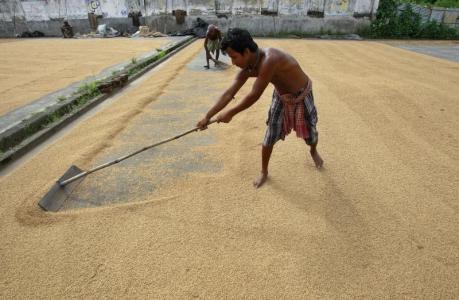December 06-2013

India’s near-monopoly on rice and soymeal exports to Iran could be a victim of the nuclear deal since India has been jacking up the price on Iran, which may now prefer to do business elsewhere.
The sanctions forced India to trim oil purchases from Iran, but it remained a loyal and large customer. In 2012 as sanctions stalled dollar payments, it started settling part of its oil debt in rupees and Iran was using those to buy goods from India since it can’t spend rupees elsewhere.
That trade in rupees gave India an edge over other rice and soymeal suppliers such as Pakistan and Brazil. India quickly established a near-monopoly over such sales to Iran.
“Rice exports to Iran rose as India had an advantage over other suppliers in payment mechanism. As sanctions are easing, India has to become much more competitive to retain the share,” R.S. Seshadri, director of a rice exporting firm, Tilda Riceland, told Reuters.
“Pakistan, Thailand lost share, but they can start grabbing that share again once financial institutions start trade with Iran in dollar terms,” he said.
India’s rice exports to Tehran, mainly of the basmati variety, surged 80 percent in the year that ended March 31 from the previous year. During the same period, shipments of soymeal jumped nearly four-fold.
Iran’s difficulties in securing rice and soymeal from other producers due to the sanctions prompted Indian exporters to take advantage of Iran’s troubles and charge hefty premiums over global prices, sometimes as high as 20 percent. But that premium has to go now.
“Dollar trade would end India’s monopoly. We can’t take Iran for granted. We need to rationalize our prices,” said a rice exporter based in the northern state of Punjab, who did not want to be named.
Like India, Pakistan was a leading rice supplier to Iran as it had a freight advantage, but due to the Western sanctions its shipments dwindled last year.
But as restrictions are set to ease, “Pakistan can become a major player as it has a logistical advantage over India”, Seshadri of Tilda Riceland said.
“Rupee payment helped India in increasing soymeal shipments. Iran is paying higher prices compared to other buyers,” said Rajesh Agrawal, chief coordinator at the Soybean Processors’ Association of India (SOPA), a trade body.
Now, Indian exporters “need to align prices in line with international prices”, otherwise India will lose its share, Agarwal said.
But that could prove a difficult task for exporters. The competition among them due to the robust Iran demand has doubled prices across India of basmati rice and soybean in the past two years and now local farmers see little reason for discounts.
A lack of supplies domestically has halved soybean crushing and farmers are holding back in the hope that local prices will stay high, said a spokesman with India’s largest soymeal exporter, Ruchi Soya Industries Limited.
“Right now our soybean prices are high, we are not competitive in the world market. Even at this price some farmers are not willing to sell,” SOPA’s Agrawal said.




















